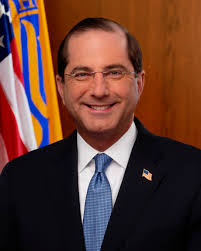By ALEX AZAR
Presidential transitions are always a time of great change, but few leaders have ushered in a shift as sweeping as the rewiring of one-seventh of the U.S. economy. President Trump has the opportunity to do just that by doubling down on the health transformation achievements of his first term.
A key to success is continuing the shift from a fee-for-service (FFS) healthcare model to value-based care (VBC). The current FFS model continues to deliver higher costs and greater utilization of healthcare resources—but not better outcomes for patients. By contrast, a VBC model ties provider payments to quality patient care that incorporates prevention and coordination.
As a country, we’ve been dabbling with value-based models for decades. Now, the time has come to rip off the proverbial Band-Aid and embrace system-wide changes.
We actually have more evidence than most people realize in favor of alternative care delivery and payment models.
Significant positive changes have already occurred in the primary care space through programs like the Medicare Shared Savings Program (MSSP).
Last fall, CMS announced that MSSP achieved the largest annual savings in program history and the seventh consecutive year of savings and high-quality care. In addition, there was significant improvement in quality measures related to diabetes and blood pressure control, as well as screening for breast cancer, colorectal cancer screening, and depression.
But there’s still untapped potential to extend these gains across the broader health system. While primary care is an important driver of value-based care, the reality is a majority of healthcare costs are attributed to specialty care. To continue bending the cost curve, we need greater emphasis on specialty areas like cardiology, oncology, and nephrology.
In 2019, during my tenure as secretary of the U.S. Department of Health and Human Services (HHS), President Trump launched the Advancing American Kidney Health (AAKH) Initiative. Our goals: to prevent kidney failure through better diagnosis and treatment, increase affordable treatment options (including home dialysis), and expand access to transplants. The program paved the way for the value-based Kidney Care Choices (KCC) model, which is now in year four. First-year results released last fall show providers in KCC were able to reduce costs while simultaneously meeting certain quality targets for patients with late-stage CKD and end-stage kidney disease.
We’ve also seen positive results in the private sector. I sit on the board of Interwell Health, a VBC kidney care company serving nephrologists, patients, and payers. Participating patients experience a home dialysis start rate that is 85 percent higher than the national average, a transplant rate 41 percent higher, and an all-cause hospitalization rate that is 20 percent lower than average. The result is better outcomes for patients and lower costs for payers.
In many ways, kidney care is a useful test bed for the efficacy of VBC in both primary and specialty care. While nephrologists are, of course, specialists, they often coordinate care for their patients, serving as a sort of “medical home” for people experiencing chronic kidney disease.
I would say that around 20 percent of doctors are enthusiastic about the idea of VBC. Another 60 percent are what I would call “coachable”—meaning that they would be willing to make the shift if they were provided with sufficient education about VBC models and enabling technologies.
That’s why the government needs to be a reliable partner in this transformation, providing stable, predictable frameworks that allow healthcare organizations to make long-term investments in care delivery reform. We need better data sharing, consistent quality metrics, and aligned incentives across programs. Only the federal government has the scope to support such large-scale change.
The new Trump administration has an opportunity to reduce healthcare costs, improve outcomes, and upend a system that practically everybody agrees isn’t working. We’ve already dipped our oars in the water, but the time for incremental change and small pilots has passed. Now it’s time to row ashore, burn our boats behind us, and fully commit to a new healthcare world that rewards value over volume.
Alex Azar was the Secretary of the U.S. Department of Health and Human Services from 2018-2021 and is currently a member of the board of directors at Interwell Health
Leave a comment




